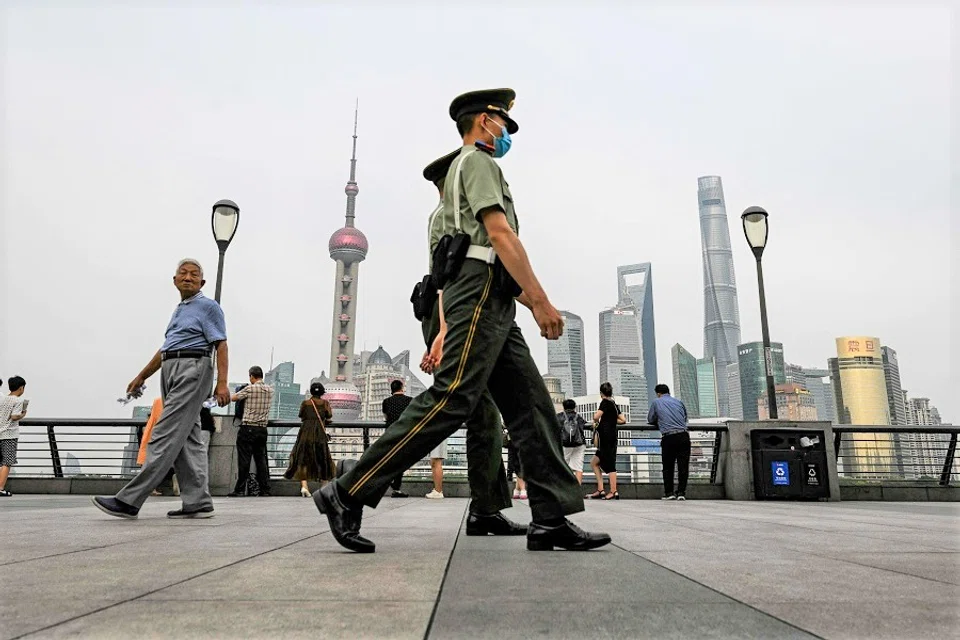Can China maintain a hard line against the US?
In this key period of China's rise, it can either choose to adopt a hard line or to cool down. History tells us that the hard line is likely to prevail, but China should be aware that this may lead to one overestimating its own strength, challenging the existing hegemon too soon, and ultimately meeting failure. The crucial question is whether the hard line is backed by wisdom. What China is going to do with the strength it has gained remains a puzzle to most countries, and this is the root of the perception of the Chinese threat.

The present time is undoubtedly a key period for the rise of China. The main issue is the proper management of China's relationship with the alpha player, which is currently beating down on China. There are two choices in the face of such suppression. China can either adopt a hard line or cool down.
History tells us that the hard line is likely to prevail because it is supported by the pride of the Chinese people. It is backed by the nationalism of the masses. Indeed, it will eventually become the political correctness that smothers all other views.
History, however, also tells us something else. In pursuing this course, the rising country will, more often than not, overestimate its own strength, challenge the existing hegemon too soon, and ultimately meet failure.
The proponents of both the hard line and the cool-down have left out some important factors. This is particularly true of the rise of China, which in modern times has been unprecedented in the rise of a major heterogeneous civilisation. The factors that have to be considered are therefore much wider and more extensive. Also, in today's international environment, the rise of great power has a different connotation than in the past.
No winners in modern warfare
Overpowering strength in itself is no guarantee of rising up.
The first thing we must note is: hard power is not working anymore and this is a consequence of the realities of the international community.
Secondly, the rise of China must necessarily be transcendental, which is due to the peculiarity of its rise as a heterogeneous civilisation.
... for China to truly achieve a peaceful rise, it must lead human civilisation to the next level, above the highest level of contemporary civilisation represented by the liberalism of the West.

Since World War II, no small or weak country has ever been annexed by means of military force. Iraq's attempt to annex Kuwait and Russia's attempt to "liberate" Ukraine have failed due to strong backlash from the international community.
In the 76 years from the end of World War II to the withdrawal from Afghanistan in 2021, the US has only had five years in which it was not directly involved in the fighting of any war. Yet it did not win a single one of its wars in those 71 years - and we are talking about a superpower with numerous allies as well as military bases established across the globe.
There are no winners in modern warfare. Even when a country manages to secure a hard-won victory on the battlefield, its very life, properties, economy, society, environment and international relations would be in tatters, unable to recover for decades to come.
Transcending Western liberalism
In the post-militancy age, the rise of a major power is determined by its overall level of development. A country that scores poorly on this cannot possibly rise up. As a civilisational state, for China to truly achieve a peaceful rise, it must lead human civilisation to the next level, above the highest level of contemporary civilisation represented by the liberalism of the West.
China has thus unwittingly forged the image of the rise of an "evil force" for itself in the international arena.

Liberalism is closely tied to modernisation. In successfully modernised countries, the values of the younger generation lean closer towards liberalism. China is no exception to this rule.
The so-called universal values are not patented by the West. To go against universal values is to place oneself in opposition to the middle class of most countries, allowing oneself to be easily demonised.
The Chinese Communist Party (CCP) has been positioning itself against universal values since 2013, and that is a mistake. The mistake lies not in opposing the Western elites' weaponisation of liberalism (as seen in Western-initiated "peaceful evolution" or colour revolutions). What's erroneous is the failure to produce a more compelling theory to supersede or transcend liberalism.
Instead of providing a better alternative, simplistic, rough and vulgar measures like shutouts, suppression and brainwashing are employed. China has thus unwittingly forged the image of the rise of an "evil force" for itself in the international arena.
To go against mainstream civilisation is self-debasement. Liberalism can be outdone, because it is in itself fraught with flaws. There are a whole series of new problems besetting humanity that liberalism cannot deal with. To outdo this ideology is to solve the problems it fails to solve. Only by doing so can China gain soft power and reduce the hindrances to its rise.
Territorial disputes and animal instincts
The hard line gains the upper hand time and again because it is a trap of human nature that feels comfortable and natural. Although our animal nature has been largely suppressed by reason during the evolution of human civilisation, it has persisted in the subconscious and has continued to influence the emotions and decisions of the majority.
How may we avoid the trap of human nature? How may its characteristics be cleverly exploited as means to an end? These are often neglected in the art of diplomacy.
It was only not so long ago that the human race rose out of the animal kingdom. We still bear some of the beastly instincts, such as territoriality, which has been somewhat transformed into ownership of private property. Nevertheless, it remains discernible in the uncompromising attitude over territorial disputes between nations and the associated nationalistic fervour.
Territorial disputes are difficult to resolve precisely because they are driven by instinct and often have nothing to do with the actual value of the territory in question. As we look back on history, we see that Japan had tried to expand its territory during World War II and failed. All its gains were regurgitated.
Despite there being a lot of friction between the democratic states in their usual dealings with one another, they would stand united against the "outsider"...

After the War, however, Japan thrived in the US-dominated liberal world order, and acquired through trade and economic dealings what it failed to gain through warfare. Territory may appear sacrosanct through the lens of human nature, but in terms of national interests, it may not actually be so.
Issue of identity
Apart from interests, the issue of identity also affects international relations.
Avoiding the establishment of an antagonistic or hostile united front is of utmost importance for the rise of a heterogeneous civilisational state in the current global environment, which is dominated by Western ideology, values and systems. Such a united front is founded on psychological identification rather than shared worldly interests.
Despite there being a lot of friction between the democratic states in their usual dealings with one another, they would stand united against the "outsider" when they are faced with the rise of something alien. This is precisely the situation China has now found itself in.
The demonisation of the "other" is the mark of identity politics. It takes on a life of its own once it happens, and kick-starts a dynamic process. Right now, in Washington and even some of the ivory towers of American academia, rarely do people dare to speak up for China openly. In China's social media, those who sing praises of the US would get doxxed.
The fact is: the CCP is still just the CCP. It has not changed much over the recent years. And yet, its image is getting worse and worse in the opinion polls in democratic countries. That's the result of dynamic demonisation, in which everything about you, whether good or bad, is seen as villainous. Even the good you do is deemed to have been done with ulterior motives.
The language of identity politics is one of "us versus them", in which we are the good guys and they are the villains.
Us versus them
Countries are always fighting with each other over injustices, trying to get to the bottom of who's right and who's wrong, only to find out that the other side is always playing double standards. As a result of their rage, they malign the other side. This is very much in line with human nature. It is also a choice that easily wins hearts on the home front. When nationalism is blazing, most leaders will want to go with the general sentiments of their people. Despicable ones will even fan the flames for their own agendas.
The language of identity politics is one of "us versus them", in which we are the good guys and they are the villains. To argue over who's right or wrong here easily leads to the pitfall of human nature - a chain of suspicions and a vicious circle of mutual demonisation, which pushes the parties to the brink of war. Wolf warrior diplomacy did not initially set out to act like a bully. The intention was to sternly refute the prejudices, absurd assertions and double standards of the West. It has not worked out well, precisely because it is an attempt to reason.
Although military force is no longer efficacious, the impulse for aggression is still a restless, subconscious undercurrent. Among animals, it is a strive for the alpha male. In street gangs, it's about seizing the throne of the Boss. In international relations, the name of the game is hegemony.
Still law of the jungle
The movie The Godfather is a timeless classic because it is a powerful portrayal of human nature. The actions and code of the Mob are more faithful to the real nature of humankind. The struggle for kingship among animals has always been a life-or-death fight. Humans have merely added more hypocrisy and complexity to the whole affair.
If China proceeds with the hard line, it must face a grim reality, for it is not just the US that it would compete with in terms of comprehensive national strength. It's the entirety of the West, along with the other liberal, democratic nations.

Between nations, we have international laws, organisations and codes of conduct. Nevertheless, these trappings have yet to change human nature. They have not transformed us into refined gentlemen, making us "benign, frank, courteous, temperate and deferential" (as the Confucians put it).
Brute force is no longer as effective as it used to be, only because things have become complicated. At the deepest level, it is still the law of the jungle that is at work between nations. Once our deeply hidden nature erupts, the edifice of civilisation, built laboriously over decades, can be torn down overnight. Just like how globalisation has been reversed and fallen apart in just a few years.
The US often speaks of dealing with China from a position of strength. If China proceeds with the hard line, it must face a grim reality, for it is not just the US that it would compete with in terms of comprehensive national strength. It's the entirety of the West, along with the other liberal, democratic nations. Their combined strength far exceeds China's.
Like the rising major powers of the past, China is susceptible to the error of becoming over-ambitious and stretching itself too far. Despite the "democratic recession", the number of liberal democracies (inclusive of all the developed countries) still constitutes 40% of the world. They account for 63.2% of global GDP, far greater than China's 15%. If they act in unison, there is a real potential for derailing China's grand project of national rejuvenation.
What China is going to do with the strength it has gained remains a puzzle to most countries, and this is the root of the perception of the Chinese threat.
A self-evaluation exercise
With this in mind, when formulating the long-term strategy for a peaceful rise, whether it takes the hard line or goes for a cool-down, certain factors that are normally neglected should be added to the equation.
The hard line is not necessarily destined to fail as long as it is backed by wisdom. The fundamental fact is that while no country wishes to fight a war against China, the impulse for compulsion by military force still exists. The main purpose of China's development of its military strength should be to deter such instinct. Overdoing it is not only pointless, but also leads to China being perceived by other countries as a threat.

What China is going to do with the strength it has gained remains a puzzle to most countries, and this is the root of the perception of the Chinese threat. Generations of Chinese leaders since Mao Zedong had vowed not to act as a hegemon, not to engage in colonialism and expansion by invasion. The promises were very sincere, but also futile, because no leader could control how future leaders will think or act, nor could they control the public sentiments of the future.
As strength grows over time, more options become available, and people's thinking could change as a result. But one thing is certain: human nature will continue to be at play.
What is China's vision for the world of the future? What role does it intend to play therein? How is it going to live with the mainstream countries and ideology of today (which, by the way, will continue to exist for a long time to come)? There ought to be concrete considerations and accounts for these aspects.
China cannot get away with just a general promise to "refrain from hegemony". It has to honestly review and evaluate itself to see whether it is indeed capable of rising above the highest level of contemporary civilisation. If it finds itself to be inadequate, it should keep a low profile, work hard to improve itself, and build the foundation for transcendence in the future.
Such evaluation must not be an exercise in wishful thinking - after all, overestimating oneself is also part of human nature. The judgement must be made from the outside and be objective.
No longer alienated
The first step in dealing with identity politics should be to remove the sense of alienation and strive for understanding and recognition. Showcasing the superiority of one's own system comes secondary. Getting the order wrong will mess things up. That's because systemic superiority is something relative. Where there are merits, there will also necessarily be faults.
If the value system of others prioritises your faults, that's what they will focus on, so much so that your merits will be disregarded. After all, your merits are of no benefit to them, whereas your faults are a threat to them.
This requires China to outperform Western countries in terms of democracy, liberty, rule of law, human rights, equality, justice and equality, and transparency, as well as a healthy civil society.

There are two ways to remove the sense of alienation. Rather than proclaiming one's differences or superiority, one should emphasise common human values, so as to foster communication and gain approval and empathy.
The second way is to strengthen oneself and eliminate the flaws in one's own system, policies and practices that are objectionable to others, rather than reject criticisms due to self-pride, "Chinese characteristics" or non-interference in internal affairs.
The basis of identity politics will be undermined by reducing the sense of alienation. This is not about pleasing others but about self-improvement and transcendence. There can be no peaceful rise without transcendence.
This requires China to outperform Western countries in terms of democracy, liberty, rule of law, human rights, equality, justice and equality, and transparency, as well as a healthy civil society.
For example, building a democracy that could be appreciated by the common folk, or an efficient and responsive governing system that could support long-term planning, build agreement, unite the people's hearts and minds, and facilitate decision-making and implementation. These are all areas where liberalism falls short.
This article was first published in Lianhe Zaobao as "中国外交的两条路线之外".





